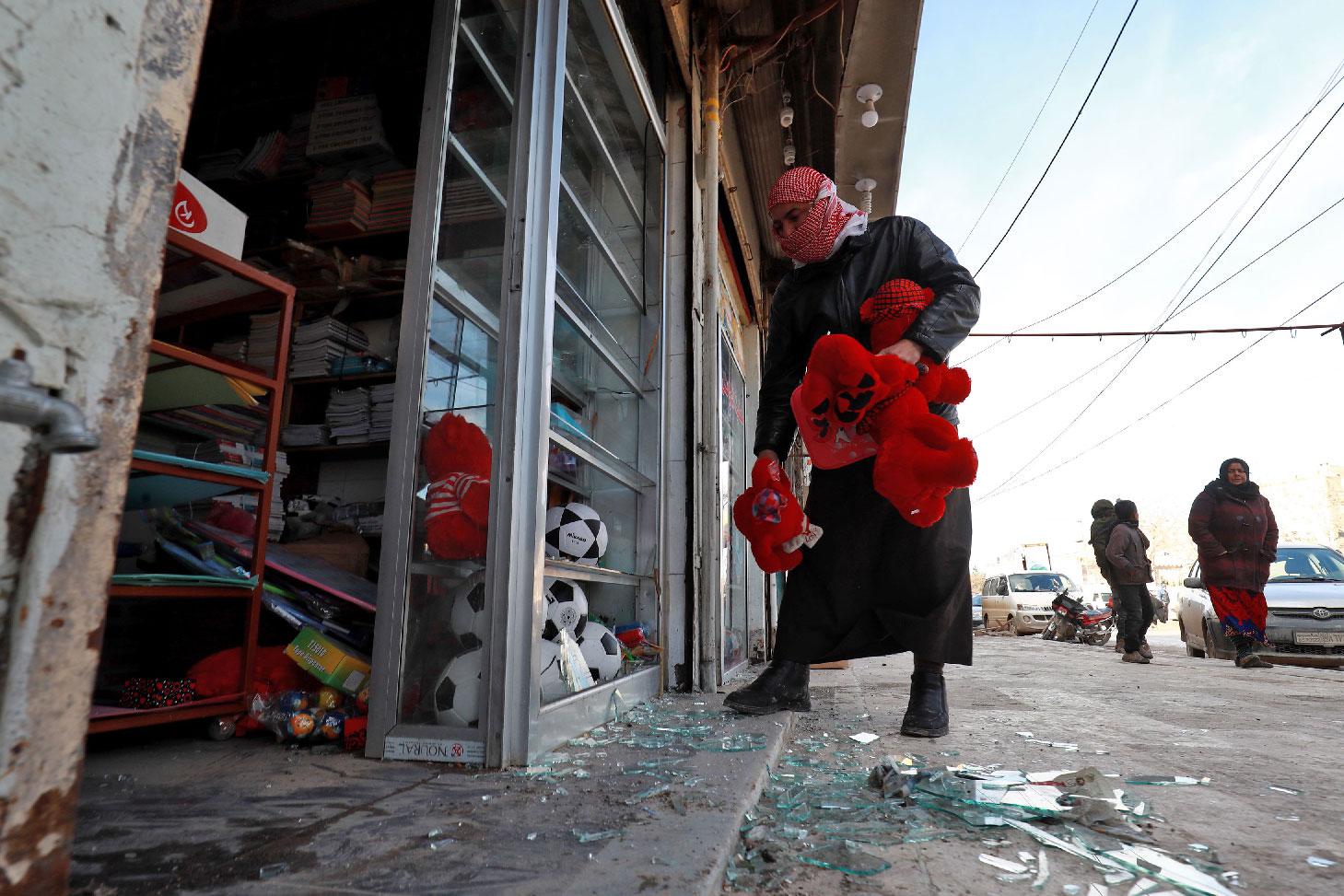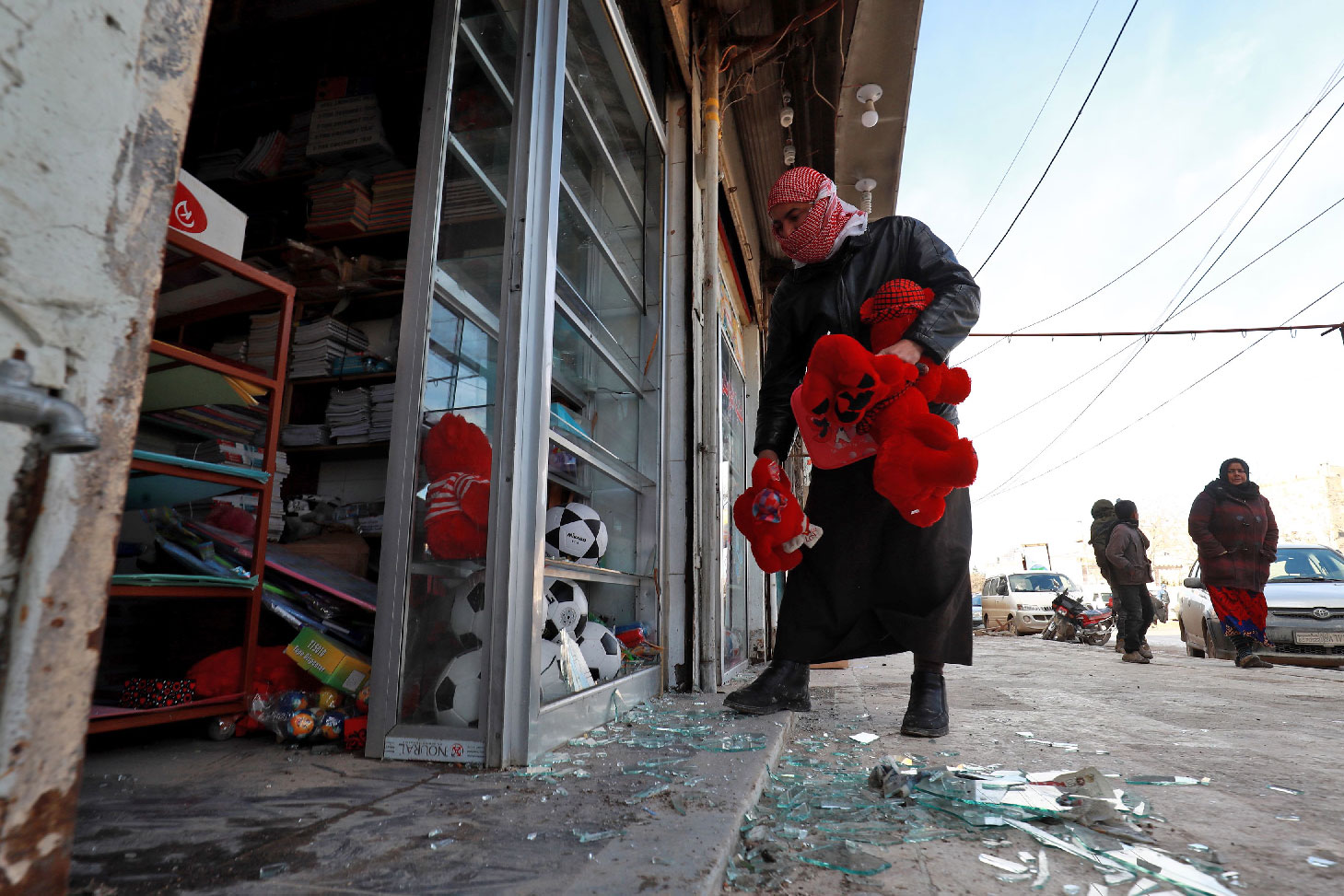Deadly attack in Manbij raises questions about US policy
MANBIJ - Charred walls, shattered windows, uncooked kebabs still on the counter -- the blast that hit US forces at this small restaurant in the central market of the flashpoint northern town of Manbij that has left residents fearful for the future.
Wednesday's suicide bombing, claimed by the Islamic State group, was the deadliest to hit US troops since they deployed to Syria in 2014.
Nineteen people were killed in the attack, among them four Americans including a US Navy servicewoman and a former Navy SEAL, US officials said on Friday.
Two US government sources said on Thursday that the United States views the Islamic State (IS) militant group as likely responsible for the attack. The group has claimed responsibility.
If IS carried out the attack, that would undercut assertions, including by US Vice President Mike Pence several hours after the blast on Wednesday, that the militant group has been defeated.
'Largely defeated'
"We come to the market but we are afraid. We go to work and we are afraid... we don't know what could happen," says Jomaa al-Qassem, eyeing the shops from his car along with his three-year-old son.
In front of the blackened storefront, armed security forces hustle curious onlookers away and are quick to prevent them from taking photos with their cellphones.
Behind its twisted metal exterior, a clump of raw red meat lies abandoned on a counter, covered with dust. Tables and cookware from the kitchen have been twisted into a tangled mess on the floor.
Run by a Washington-backed town council since the US-led coalition and its ground partners pushed out jihadists in 2016, Manbij has been a realm of relative quiet.
The town was considered sufficiently secure that a group of top US military commanders and lawmakers strolled through the same market place without body armour during a tour of the area last summer.
But the US military presence in the town has been thrown into question after President Donald Trump confounded his own national security team with a surprise Dec. 19 decision to withdraw all 2,000 US troops from Syria, claiming the IS had been "largely defeated".
Senator Lindsey Graham, a longtime Trump supporter who was among this summer's visitors, has been one of the most vocal critics of the president's decision and was in Ankara for talks with top officials on Friday.
'New life'
Trump's decision was made without deliberation, left allies "bewildered" and has rejuvenated IS, the official formerly in charge of fighting the jihadists said Friday.
Brett McGurk, who quit as America's envoy to the anti-IS coalition after Trump declared victory, warned a US withdrawal would shore up dictator Bashar al-Assad and lessen America's leverage with Russia and Iran.
And "the Islamic State and other extremist groups will fill the void opened by our departure, regenerating their capacity to threaten our friends in Europe -- as they did throughout 2016 -- and ultimately our own homeland," McGurk wrote in an opinion piece in The Washington Post.
McGurk, a Barack Obama-era appointee whom Trump kept on, said he was in the US embassy in Baghdad on December 17 when he got an urgent call from Secretary of State Mike Pompeo informing him of Trump's decision.
It came just days after National Security Advisor John Bolton had suggested an indefinite US troop presence in Syria, and as McGurk and then defense secretary Jim Mattis met coalition partners to confirm commitments for at least the next year.
"My counterparts in coalition capitals were bewildered," McGurk said.
"The president's decision to leave Syria was made without deliberation, consultation with allies or Congress, assessment of risk, or appreciation of facts."
Mattis quit after Trump's decision.
"The irony is that defeating the Islamic State is what the president said from the beginning was his goal," McGurk said.
"His recent choices, unfortunately, are already giving the Islamic State -- and other American adversaries -- new life."
'Fireball'
Next to the blast site outside the grill house in Manbij, Abu Abdel Rahman lifts an armful of red teddy bears out of his storefront display, carefully avoiding the shattered glass.
Just metres (yards) away from the restaurant, his shop was also hit by the blast.
"I was at the door of my shop and saw a fireball come out of the restaurant. Then, there were body parts on the ground," he said, a red keffiyeh headscarf wrapped around his face to help fend off the cold winter air.
The four Americans killed in the blast were two soldiers, a civilian defence department employee and a Pentagon subcontractor.
The US Defence Department has previously reported only two American personnel killed in combat in Syria, in separate incidents.
McGurk wrote in The Washington Post that Trump had made his decision after a phone call with Turkish President Recep Tayyip Erdogan, who had said Istanbul would lead the fight against IS remnants in Syria.
The attack came as tensions between Washington's Syrian Kurdish ground partner and its NATO ally Turkey flare.
Ankara views the Syrian Kurdish People's Protection Units (YPG) as a "terrorist offshoot" of the Kurdistan Workers Party (PKK), which has waged a deadly insurgency for self-rule in southeastern Turkey since 1984.
Erdogan has threatened an all-out offensive to clear the group from Turkey's border.
At the town's entrance, security checkpoints manned by forces of the US-backed Manbij Military Council meticulously check vehicles and the IDs of people entering and exiting the town.
Regular patrols move through the streets.
'Sabotage'
But for Malek al-Hassan, it is not enough.
The 45-year-old was in the market that day to buy books for his children.
"When the explosion happened, I don't know how we managed to escape," he says.
"We hope the forces will be more vigilant at the roadblocks, and that they will work hard to prevent these infiltrators from committing these acts of sabotage," he says.
After sweeping across swathes of Syria and Iraq in 2014, the jihadists' cross-border "caliphate" has been erased by multiple offensives and is now confined to a tiny embattled enclave in eastern Syria close to the Iraqi border.
But despite the stinging defeats, IS has proved it is still capable of carrying out deadly attacks using hideouts in the sprawling desert or sleeper cells in the towns.
One day after the blast, Naassan Dandan's eyes well up with tears when he remembers the attack.
"I was outside when the explosion happened and was thrown to the ground," says the man in his 40s, still clearing shards of glass from his nearby photography studio.
On the walls of his shop, child portraits he has taken throughout his career are covered in black dust.
"I saw the bodies -- the dead and the wounded," he says, as two young passers-by stop to lend a hand with the clean up.


